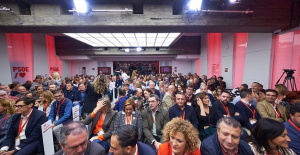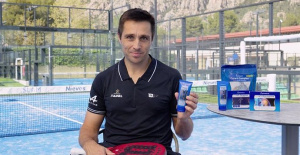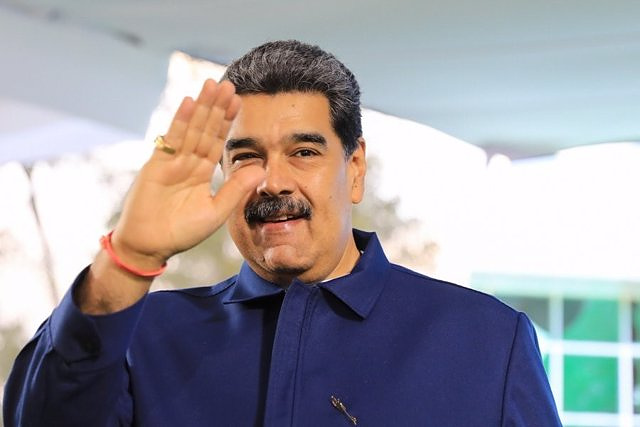He once again demands that the Venezuelan oil company deliver the original documentation on which he bases his complaint
MADRID, 3 Feb. (EUROPA PRESS) -
The former Vice Minister of Electrical Development of Venezuela Javier Ochoa Alvarado has asked the judge of the National Court María Tardón to request again from the Venezuelan oil company PDVSA the documentation that was requested in an order of November 17, 2020, having "doubts founded" on its authenticity, while requesting that a statement be taken from the Venezuelan president, Nicolás Maduro.
In a letter from last Tuesday, to which Europa Press has had access, the defense of Ochoa Alvarado is interested in the head of the Central Investigating Court Number 3 that "take a statement, as witnesses or as investigated", Maduro and the former senior PDVSA official César Rincón.
In the case of Maduro, it points to "his condition as a director member of the Board of Directors of PDVSA during, at least, the year 2012 that is the object of this instruction, as a result of the content of the report of the UDEF - Economic Crime Unit and Prosecutor-- of June 20, 2022 that attributes responsibility" in the operations investigated.
Regarding Rincón, he recalls that "he held management positions at PDVSA and Bariven, during the entire period from 2009 to 2015, the subject of this instruction." In addition, he emphasizes that his signature appears in several of the purchase operations investigated for a value of more than 615 million dollars.
"Due to his level of financial authorization (between 4.6 and 9.3 million dollars), his intervention and authorization of operations was mandatory and the highest rank in the vast majority of the operations investigated," he stresses.
In addition, it once again asks Tardón to again require PDVSA to provide "all the minutes of the Operations Committee and the Board of Directors" that have been requested since that resolution of November 17, 2020.
Consequently, the former Venezuelan vice minister anticipates that "the appropriate legal warnings must be issued in the event that the complainant PDVSA persists in its rebellious will to fully comply with said order."
Likewise, it urges to obtain from PDVSA "the original documents of each and every one of the documents that it has contributed to the cause, both with its complaint and later."
And this in the face of "the well-founded doubt about the authenticity of said documents", for which he sees it necessary "to carry out the corresponding expert evidence that proves their authenticity or falsehood, where appropriate".
In this first separate piece of the 'PDVSA case', the judge investigates a lawsuit filed by the oil company itself against more than twenty people, including individuals and legal entities, for the alleged crimes of money laundering committed in Spanish territory and those prior to produce it as a criminal organization for the commission of acts of corruption, fraud and other crimes abroad.
The complaint is directed against Ochoa Alvarado; former PDVSA purchasing managers Alfonzo Eliézer Graviña and José Luis Ramos Castillo; the former purchasing manager at the Bariven subsidiary Christian Maldonado Barillas; Rafael Reiter Muñoz, considered the 'right hand' of former PDVSA president Rafael Ramírez; and against various members of the Rincón family and other oil businessmen.
Specifically, PDVSA points to the existence of a "criminal organization" made up of various people and a business network that would have carried out "various dissimulation and camouflage operations in order to defraud it and obtain an illicit benefit" that at least in part it would have been laundered in Spain through the purchase of real estate and the creation of companies.
In a second piece, the National Court investigated the complaint filed by the Anti-Corruption Prosecutor in June 2017 for crimes of money laundering regarding "funds from an activity aimed at defrauding and/or appropriating the assets of PDVSA and other companies public companies of Venezuela", such as Corpoelec.
In this case, the complaint pointed to the former Vice Minister of Energy of Venezuela Nervis Villalobos, his wife Milagros Coromoto Torres and José Trinidad Márquez and Katilin Miguelina Mijares, as well as various legal entities linked to them. However, the National Court archived this line of investigation a few months ago when it did not find "sufficient indications of possible criminal activity."
In the third piece, Tardón focuses on the facts contained in an October 2018 report signed by the UDEF that indicates the existence of "a new operation suspected of money laundering" that would have been carried out by Villalobos to launder "funds of Venezuelan citizens from corruption and fraud" at PDVSA.
The operation, which would have benefited Villalobos, the former legal adviser to the Venezuelan Ministry of Petroleum Carmelo Urdaneta and the president of Globovisión Raúl Gorrín, would be based on an alleged investment by the former vice minister in a Maltese SICAV for which he would have received a partial refund through participations in a Spanish company with important real estate assets, Columbus One, and the assignment of a collection right over it for more than 6 million dollars.

 Exploring Cardano: Inner Workings and Advantages of this Cryptocurrency
Exploring Cardano: Inner Workings and Advantages of this Cryptocurrency Seville.- Economy.- Innova.- STSA inaugurates its new painting and sealing hangar in San Pablo, for 18 million
Seville.- Economy.- Innova.- STSA inaugurates its new painting and sealing hangar in San Pablo, for 18 million Innova.- More than 300 volunteers join the Andalucía Compromiso Digital network in one month to facilitate access to ICT
Innova.- More than 300 volunteers join the Andalucía Compromiso Digital network in one month to facilitate access to ICT Innova.-AMP.- Ayesa acquires 51% of Sadiel, which will create new technological engineering products and expand markets
Innova.-AMP.- Ayesa acquires 51% of Sadiel, which will create new technological engineering products and expand markets The PSOE is holding a Federal Committee this Saturday that will serve to close ranks with Sánchez so that he does not resign
The PSOE is holding a Federal Committee this Saturday that will serve to close ranks with Sánchez so that he does not resign The Ibex 35 closes the week at its highest since 2015 and is already looking at 11,200
The Ibex 35 closes the week at its highest since 2015 and is already looking at 11,200 RELEASE: Dogfy Diet leads in canine nutrition with revolutionary natural solutions
RELEASE: Dogfy Diet leads in canine nutrition with revolutionary natural solutions STATEMENT: Fernando Belasteguín Curarti ambassador in China
STATEMENT: Fernando Belasteguín Curarti ambassador in China How Blockchain in being used to shape the future
How Blockchain in being used to shape the future Not just BTC and ETH: Here Are Some More Interesting Coins Worth Focusing on
Not just BTC and ETH: Here Are Some More Interesting Coins Worth Focusing on UPV students build a prototype of a wooden house to move to Equatorial Guinea
UPV students build a prototype of a wooden house to move to Equatorial Guinea The UA opens the call for the Impulso 2024 Awards for the best innovative business initiatives
The UA opens the call for the Impulso 2024 Awards for the best innovative business initiatives ALI, virtual assistant from Alicante, internationally recognized by the OECD
ALI, virtual assistant from Alicante, internationally recognized by the OECD Retrópolis brings the golden age of video games and computing to the UPV
Retrópolis brings the golden age of video games and computing to the UPV A million people demonstrate in France against Macron's pension reform
A million people demonstrate in France against Macron's pension reform Russia launches several missiles against "critical infrastructure" in the city of Zaporizhia
Russia launches several missiles against "critical infrastructure" in the city of Zaporizhia A "procession" remembers the dead of the Calabria shipwreck as bodies continue to wash up on the shore
A "procession" remembers the dead of the Calabria shipwreck as bodies continue to wash up on the shore Prison sentences handed down for three prominent Hong Kong pro-democracy activists
Prison sentences handed down for three prominent Hong Kong pro-democracy activists ETH continues to leave trading platforms, Ethereum balance on exchanges lowest in 3 years
ETH continues to leave trading platforms, Ethereum balance on exchanges lowest in 3 years Investors invest $450 million in Consensys, Ethereum incubator now valued at $7 billion
Investors invest $450 million in Consensys, Ethereum incubator now valued at $7 billion Alchemy Integrates Ethereum L2 Product Starknet to Enhance Web3 Scalability at a Price 100x Lower Than L1 Fees
Alchemy Integrates Ethereum L2 Product Starknet to Enhance Web3 Scalability at a Price 100x Lower Than L1 Fees Mining Report: Bitcoin's Electricity Consumption Declines by 25% in Q1 2022
Mining Report: Bitcoin's Electricity Consumption Declines by 25% in Q1 2022 Oil-to-Bitcoin Mining Firm Crusoe Energy Systems Raised $505 Million
Oil-to-Bitcoin Mining Firm Crusoe Energy Systems Raised $505 Million Microbt reveals the latest Bitcoin mining rigs -- Machines produce up to 126 TH/s with custom 5nm chip design
Microbt reveals the latest Bitcoin mining rigs -- Machines produce up to 126 TH/s with custom 5nm chip design Bitcoin's Mining Difficulty Hits a Lifetime High, With More Than 90% of BTC Supply Issued
Bitcoin's Mining Difficulty Hits a Lifetime High, With More Than 90% of BTC Supply Issued The Biggest Movers are Near, EOS, and RUNE during Friday's Selloff
The Biggest Movers are Near, EOS, and RUNE during Friday's Selloff Global Markets Spooked by a Hawkish Fed and Covid, Stocks and Crypto Gain After Musk Buys Twitter
Global Markets Spooked by a Hawkish Fed and Covid, Stocks and Crypto Gain After Musk Buys Twitter Bitso to offset carbon emissions from the Trading Platform's ERC20, ETH, and BTC Transactions
Bitso to offset carbon emissions from the Trading Platform's ERC20, ETH, and BTC Transactions Draftkings Announces 2022 College Hoops NFT Selection for March Madness
Draftkings Announces 2022 College Hoops NFT Selection for March Madness



























